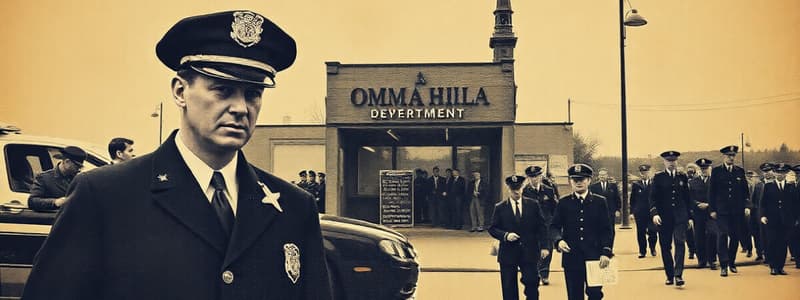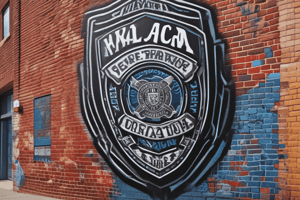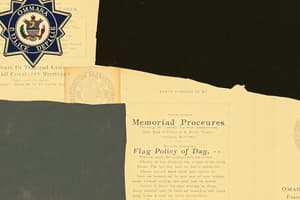Podcast
Questions and Answers
What action is taken if the owner of private property denies media access during a crime scene investigation?
What action is taken if the owner of private property denies media access during a crime scene investigation?
- Officers will ensure the media does not enter the property. (correct)
- Media is allowed to enter if police are present.
- Media may enter only if they have a valid press badge.
- Officers will request the owner's permission again.
Which statement about individuals in police custody is accurate?
Which statement about individuals in police custody is accurate?
- They may be photographed by media representatives.
- They can request to speak on camera.
- They are prohibited from discussing the incident with media. (correct)
- They can freely discuss the incident with the media.
What should investigative officers do when they arrive on-scene and encounter media?
What should investigative officers do when they arrive on-scene and encounter media?
- Building rapport with the media may provide useful information. (correct)
- Conduct interviews with the media immediately.
- Avoid interaction and focus solely on the investigation.
- Inform the media of all aspects of the investigation.
How should officers handle conflicts with media representatives?
How should officers handle conflicts with media representatives?
What must officers do when a media representative is arrested?
What must officers do when a media representative is arrested?
What is the primary objective of the Omaha Police Department (OPD) in their relationship with the news media?
What is the primary objective of the Omaha Police Department (OPD) in their relationship with the news media?
Which of the following is NOT considered public information according to OPD policy?
Which of the following is NOT considered public information according to OPD policy?
Who is responsible for handling information requests from both the media and community members?
Who is responsible for handling information requests from both the media and community members?
What is one condition under which OPD employees are expected to release information to the news media?
What is one condition under which OPD employees are expected to release information to the news media?
In what scenario can freelance news media representatives be treated differently according to OPD policy?
In what scenario can freelance news media representatives be treated differently according to OPD policy?
What role does the PIO play regarding media responsiveness?
What role does the PIO play regarding media responsiveness?
How are on-scene command officers expected to approach information release?
How are on-scene command officers expected to approach information release?
What factor does NOT limit the type of information released by OPD to the media?
What factor does NOT limit the type of information released by OPD to the media?
Who is primarily responsible for preserving the integrity of the crime scene?
Who is primarily responsible for preserving the integrity of the crime scene?
Under what circumstances may officers release information about suspects or victims to the media?
Under what circumstances may officers release information about suspects or victims to the media?
What is the role of the command officer or their designee when the PIO is absent?
What is the role of the command officer or their designee when the PIO is absent?
What should officers do before conducting an on-camera interview with the media?
What should officers do before conducting an on-camera interview with the media?
What restriction is placed on employees of the OPD when it comes to media interviews?
What restriction is placed on employees of the OPD when it comes to media interviews?
Where can media representatives be allowed access during a crime scene event?
Where can media representatives be allowed access during a crime scene event?
What is a media staging location used for during a crime incident?
What is a media staging location used for during a crime incident?
Flashcards
Public Information
Public Information
Information about the department, events, or procedures that's newsworthy, doesn't compromise safety or privacy, and doesn't interfere with the department's mission.
Public Information Office (PIO)
Public Information Office (PIO)
A designated department representative responsible for communicating with the news media on behalf of the OPD.
Omaha Police Department's Information Release Policy
Omaha Police Department's Information Release Policy
The policy that outlines the OPD's approach to releasing information to the public.
News Media Representatives
News Media Representatives
Signup and view all the flashcards
Release of Information to the Media by On-Scene Command Officers
Release of Information to the Media by On-Scene Command Officers
Signup and view all the flashcards
PIO's Role in Responding to Scenes
PIO's Role in Responding to Scenes
Signup and view all the flashcards
PIO Responsibilities
PIO Responsibilities
Signup and view all the flashcards
PIO's Relationship to Department Policies
PIO's Relationship to Department Policies
Signup and view all the flashcards
Officer's Primary Responsibility at a Crime Scene
Officer's Primary Responsibility at a Crime Scene
Signup and view all the flashcards
Media Information Release
Media Information Release
Signup and view all the flashcards
Suspect/Victim Information Release
Suspect/Victim Information Release
Signup and view all the flashcards
Seeking PIO Assistance
Seeking PIO Assistance
Signup and view all the flashcards
Media Interview Approval
Media Interview Approval
Signup and view all the flashcards
Media Preparation for Interviews
Media Preparation for Interviews
Signup and view all the flashcards
Live Media Coverage
Live Media Coverage
Signup and view all the flashcards
Media Access to Crime Scenes
Media Access to Crime Scenes
Signup and view all the flashcards
Media Access on Private Property
Media Access on Private Property
Signup and view all the flashcards
Media Access to Detainees
Media Access to Detainees
Signup and view all the flashcards
Media as a Source of Information
Media as a Source of Information
Signup and view all the flashcards
Media Ride-Along Requests
Media Ride-Along Requests
Signup and view all the flashcards
Mediating Media Conflicts
Mediating Media Conflicts
Signup and view all the flashcards
Study Notes
News Media Policy
- A professional working relationship between police and news media is essential.
- News media representatives are permitted to work within the law, without interference from police employees, as long as their activities do not unduly interfere with department operations or infringe on individual rights.
- Information will be released impartially.
- Omaha Police Department (OPD) policy is to release relevant information while protecting victims' rights, respecting individuals in custody, and preventing the disclosure of confidential information.
- OPD employees must follow OPD "Records – Information Dissemination" policy when releasing information to the media.
Definitions
- Public Information: Information of public interest not legally protected, not interfering with department operations, nor infringing upon any rights, or compromising safety or privacy of employees, victims, witnesses.
- News Media Representatives: Individuals directly employed by broadcast or print media agencies; freelancers are considered part of the general public unless authorized by the Chief of Police.
- Public Information Officer (PIO): OPD's central information source for the release of information to news media/community; directly responsible to the Chief of Police.
Procedure
- Public Information Office (PIO): Responsible for:
- On-call responses to news media (contact information in Appendix A)
- Preparing and distributing news releases, coordinating with other units for notifications (e.g., Traffic, CIB) about events.
- Coordinating news conferences.
- Assisting units in disseminating information to news media regarding investigations.
- Assisting in crisis situations within the department
- Release of Information by On-Scene Command Officers:
- Officer's primary responsibility is to preserve the crime scene, gather evidence, and complete investigations.
- In the absence of the PIO, the command officer will release information to the media (offense, time, location of incident) in a timely manner.
- Media Interviews:
- Officers will refer media to the PIO regarding policies, procedures, or department events.
- On-scene interviews will be prepared off-camera.
- Officers are not responsible for censoring the media but responsible for safety.
- Media Access to Crime Scenes:
- Media representatives have access where the general public is allowed (in accordance with any policies).
- Media may not shield subjects.
- Officers will provide media staging areas.
- Media Access to Persons in Police Custody:
- Individuals in custody will not be interviewed by or photographed by the press.
- Media Relations:
- On-scene officers may give information to reporters; information may be helpful to their investigation.
- Officers should work to build rapport with reporters to increase information flow.
- Ride-Along Requests:
- Media representatives can request ride-alongs through the PIO.
- Requests should outline the story focus and be approved by the Chief of Police.
- Specific Circumstances:
- Incidents involving child victims, sexual assault, or a homicide (collaboration between commander of the appropriate investigative unit and the PIO).
- Officer-involved incidents. (only Chief of Police or designee can release information to the media)
- Multi-Law enforcement agency responses.
- The PIO ensures coordination across agencies and releases information
- Fire Scenes
- Media release for multiple alarm fires, death by fire, arson investigations, or hazardous material incidents are handled by the Chief of the Omaha Fire Department.
- Other Important Information
- OPD employees must report conflicts, confrontations with media representatives.
- Media must follow all traffic laws around the crime scene.
- Media may not block emergency vehicles accessing the scene.
- Media must not stop on interstate to get to the scene.
- Media must not enter private property when requested for safety concerns.
Studying That Suits You
Use AI to generate personalized quizzes and flashcards to suit your learning preferences.




